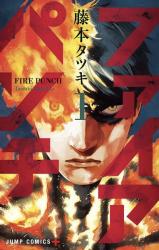At the risk of sounding pretentious I'll try to break down what I loved about the series. Note: ** Heavy spoilers ahead**.
I get the impression that people go into this expecting it to be the next "great" battle manga when they really should look at it for what it is: a black comedy. Fire Punch (FP) consistently undermines its central conceit but its never above itself to relish in it. You've got a post-apocalyptic dystopian world where superpowers exist and there is a clear divide between human's and non-human's among people. You've got your main character (named Agni) who's main power is almost instantaneous regeneration who is subsequently condemned to burn with a never-ending flame by a guy that slaughters his village and sister. You've got the main ingredients to make a killer revenge story and yet FP never truly follows up on that premise instead opting a more comical route to explore a rather more interesting idea: how we view others, how others view ourselves, and how we view ourselves. (Or how we use narratives to view ourselves and others.)
The major complaint I read is that there's no real "plot" but the lack of it doesn't mean there's a lack of a story. It's true that a lot of the development never leads to any narrative goal(s) but FP early on excludes this from ever being otherwise
(Togata's reference that there's no Ice Witch and humanity's days are numbered in early chapters makes this clear that there's no way in hell this story is ending with anything else than everyone dying)
and to assume that it does is setting yourself up for disappointment. I mean get this:
! the target of your revenge, the man that slaughtered your village, sister, and condemned you to live a life of agony turns out to be a withered and remorseful man who pleads you to forgive him.
With a single character re-introduction, the premise is thrown out. What then?
Now here is where FP really gets going. It starts referencing films and dramatic theory as a way of understanding the protagonist. It starts introducing irrelevant side characters for the sole purpose of taking the main "baddie's" position as the target of revenge. And then it fails. It falls flat on its face because
it turns out the protagonist isn't just some avenger. No, he's also been trying to not give into the conditions that put him in this position. But the narrative is already in motion and so he kills some people (either intentionally or by accident) and those who view the battle end up either revering him as a god or fearing him as a devil. So now our protagonist is the leader of a cult; that is those who he saved and thus finds himself beginning to act like a savior/god as well.
People latch onto the protagonist because he's so absurd and because he's so absurd people create narratives about him to try to understand him. Narratives like him being a god, a film lead, an avenger, a lover, a brother, etc. Yet the protagonist consistently undermines all of them. He's not an avenger. He's not a savior, a god, a messiah, he is not an actor, he is an actor, he is not a brother but he kind of is. At points you feel as confused as Agni because he himself has no clue who he truly is; you think he's mad and so does he. He's forced to play so many roles that they all seem real and true but therein lies FP's main idea. All those roles are him. If people are defined by their actions then Agni is all of the things he did. He is a murder, an avenger, a god, a savior. As Judah says, "Anyone can be anything for anyone" and nowhere is this more true in Agni, Doma's and Judah's case.
Doma becomes a teacher for children. Judah becomes the target of Angi's affection and a substitute for his sister. Agni becomes Fire Punch and finally San, a man who worshipped Agni as a god.
As a side note there's a great visual cue that lends to this idea of building narratives to understand others and yourself. In the second half of the story when
Agni lacks his never-ending fire, he damages his face (either by fire, machete, or otherwise) as if he was putting on a mask before slaughtering his opponents almost as if he was putting on a performance.
There's another scene where
! Togata discuss his gender dysphoria and his crisis of identity that is immediately juxtaposed with the Agni's new role as god of Agnism.
The idea that we're somehow acting out for others based on our appearances is referenced in passing yet is crucial to understand Togata's character and his infatuation with films as well as Agni's own actions and introspection.
I'm really leaving a lot out
(like Doma's death, the ending, the jarring jumps to showcase battle aftermath as if they're teasing the reader they won't get what they want ("epic" fights), the sheer fun of it all, etc.)
but this sums up my first reading of FP. Overall I really enjoyed the series and thought it great fun. Don't go into it expecting it to be "epic" fights instead of a black comedy and you'll find yourself enjoying it.





